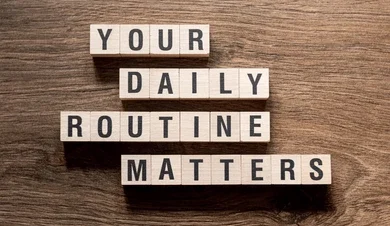One of the great things about getting back to school is the structure it can bring to the more unstructured nature of summer vacation. Morning alarms and tight schedules can bring added stress for sure, but the hum of a routine also offers many benefits to your mental well-being.
I recently was speaking with an athlete who had just graduated from college, and was struggling with feelings of depression and lack of motivation. Confused as to why she was feeling so down after such an accomplishment, we looked at the drastic changes in her schedule that had taken place in her life since graduation. Not only had she lost the steady routine of classes and athletic practice, but also the daily connection with that circle of friends. Her new job was remote, and she was tasked with managing her own time schedule.
This kind of dramatic shift from a highly structured environment to a less structured one can be jarring, and leave you feeling unmotivated, isolated and eventually even depressed. Our bodies thrive on routine: routines like waking and sleeping, eating at regular intervals, and even going to the bathroom regularly. Having a rhythm to our day can help us feel safe and secure and more accomplished in our life.
The benefits of routines.
There are many benefits to establishing a routine in your life, including:
- Reduced stress. Predictability can make you feel more in control. When you focus on things in your control, challenges appear more surmountable, which can reduce stress.
- Improve sleep. Waking and sleeping at the same time each day help improve the ability to fall asleep and the quality of that sleep.
- Improve focus. By providing more certainty and control, a routine can help you stay focused on what’s important and reduce decision fatigue.
- Boost confidence. By creating supportive habits of your choosing and then following through on them, you can feel more accomplished. For instance, following through on your morning exercise routine can cultivate a sense of confidence that permeates throughout your day.
- Improve bodily functions. We are creatures of rhythm, and our bodies thrive on routine.Eating at regular intervals, sleeping at regular times and other habits can support internal processes like digestion, which, in turn, can support mental well-being.
How does routine connect to performance?
Try answering the following questions:
- Have you ever had a time when your performance turned out looking completely different (worse) than your practice?
- Have you ever had a time that your emotions got in the way of doing your best when it counts most?
- Have you ever experienced elevated symptoms of anxiety, like shaky hands, rapid heartbeat or feelings of nausea before a big event?
When you are training, you are often in a familiar environment with familiar people, and the body feels relaxed. When you get ready to perform, however, whether you are about to run a race, play a song or speak in front of an audience, your body automatically senses the uncertainty of the situation and responds to the increased pressure with feelings we call nerves, or stress.
Nerves are completely normal. I will say that again. Nerves are completely normal and are a sign that you are doing something you care about. They are not a sign of impending doom. Instead, they are a sign that your body is getting ready to perform. Rather than interpreting nerves as something scary and bad, think of them as a messenger, letting you know what the body needs from you right now to perform its best.
Pre-performance routines can help manage the nerves.
Performance, like public speaking or competing, triggers nerves precisely because we can’t guarantee the outcome. But that is what makes them so fun! If we knew how it would turn out every time, it would quickly get boring. Instead of trying futilely to exert control over the outcome, we can use routines to give us a sense of control and to help ourselves calm down and get focused.
Here is an example of a routine that may help you find that calm center you are seeking. If before a performance, give yourself about ten minutes to go through this routine.
- Make a playlist with music that puts you in the right mood for the occasion. If you need to pump up, high-tempo music might work best. If you need to relax, choose soothing music of a slower tempo, aiming for around 60-90 beats per minute.
- As you listen to the music, practice a few minutes of smooth, rhythmical breathing. Rather than trying to force a certain breath rhythm, just observe the breath and allow it to naturally slow down with each exhale. Breathing can help you drop excess tension and calm the busy mind.
- Visualize yourself performing at your best, smiling and feeling confident. Create a 20-30 second highlight reel and replay it in your mind several times.
- Tell yourself a positive personal statement that also feels authentic, like “I am strong and courageous,” or “I believe in myself.”
- Smile, take another slow, easy breath, and GO!
Compassionate discipline is the key.
As with just about anything, balance is important. Too much rigidity in your routine can actually create anxiety when you are not able to adhere strictly to the plan. Having a routine provides some certainty and control to uncertain environments, like competition. But chaotic environments demand flexibility to respond to the changing demands of the situation. Rather than throwing out your routine completely when circumstances change, try to adapt. For example, listen to music while on your drive to the event and practice rhythmic breathing while walking. And above all, give yourself grace for not doing everything perfectly.
If you would like to learn more about using routines to help you manage stress and improve performance, reach out to me for a COMPLIMENTARY CONSULTATION.


